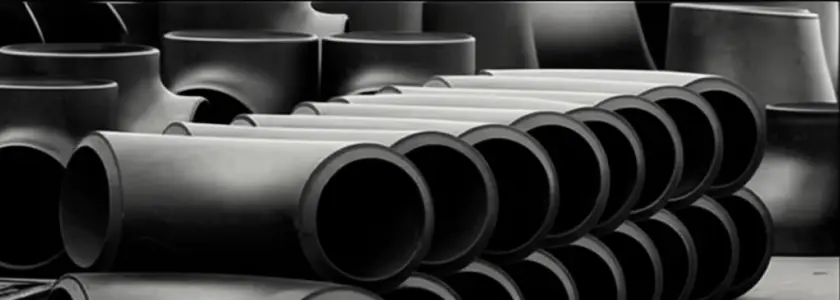

Alloy steel pipes and pipe fittings are widely used in various industries due to their excellent strength, durability, and resistance to high temperatures and pressure. Om Steel is a trusted manufacturer and supplier of high-quality alloy steel pipes and pipe fittings that are designed to meet the diverse needs of our clients.
Our alloy steel pipes and pipe fittings come in a wide range of sizes and grades, making them suitable for use in various applications. We offer seamless and welded pipes and a variety of fittings, including elbows, tees, reducers, and flanges.
One of the key features of our alloy steel pipes and pipe fittings is their excellent resistance to corrosion and wear and tear, ensuring long-lasting performance in harsh environments. Our products are also highly ductile, making them easy to fabricate and install.
At Om Steel, we use the latest technology and manufacturing techniques to ensure that our products meet the highest quality standards. Our team of experts is always available to provide you with the necessary guidance and support to ensure that you get the right product for your specific application.
Low vs High Alloy Steel in Piping
Low Alloy Steels
Low alloy steels are those that contain less than 5% of other elements besides iron and carbon. These steels have a low carbon content, typically around 0.05% to 0.3%, which makes them more ductile and easier to weld than high carbon steels. Low alloy steels also have good machinability, formability, and toughness.
Another advantage of low alloy steels is their fine grain size, which improves their mechanical properties such as tensile strength, yield strength, and impact resistance. However, they may not be suitable for high temperature or pressure applications due to their lower strength compared to high alloy steels.
High Alloy Steels
High alloy steels contain more than 5% of other elements besides iron and carbon. These elements can include chromium, nickel, molybdenum, vanadium, tungsten, cobalt or other metals that enhance the properties of the steel such as corrosion resistance or hardness.
High alloy steels also have a higher carbon content than low alloy steels, typically around 0.3% to 1.5%, which makes them harder and more wear-resistant. However, this also makes them more brittle and difficult to weld compared to low alloy steels.
Types of Alloy Steel Pipe Fittings, Flanges, and Elbows
Elbows
Reducing Elbows
Tees
Lateral Tee
Flanges
Slip-On Flange
Weld-Neck Flange
Blind Flange
Socket-Weld Flange
Standard Specifications for Alloy Steel Pipe Fittings
ASTM A234 WPB is a standard specification for piping fittings of wrought carbon steel and alloy steel. These fittings are intended for moderate and high-temperature services, and they are commonly used in pressure piping systems.
ASTM A234 WPB is the most common material grade used in manufacturing pipe fittings. It has excellent weldability and is easy to fabricate. It also has good mechanical properties, including tensile strength, yield strength, and hardness.
ASME A234 WPB vs. ASTM A234 WPB
ASME (American Society of Mechanical Engineers) and ASTM (American Society for Testing and Materials) are two different organizations that develop standards for materials, products, systems, and services. ASME develops codes and standards for mechanical engineering practices while ASTM develops standards for materials.
However, many people use the terms ASME A234 WPB and ASTM A234 WPB interchangeably because they refer to the same standard specification.
ASTM A234 Gr WPB
ASTM A234 WP
A234WP91 Alloy Steel Pipe
ASTM A234 WP1 & ASTM A 234 WP11
ASTM A234 Fittings
ASTM A234 Socket Weld Fittings
A234 Gr WPB
A234 WP11 Pipe Fittings
High-Quality ASTM A234 WP11
ASTM A234 Grade WP11
ASTM A234 Gr
A234 WPB
A234 Fittings
A234 WP11 Pipe Fittings Manufacturers
Buttweld Fittings
Socket Weld Pipe Fittings Sizes
Alloy steel Pipe and Pipe Fittings
Specifications
| Specifications | ASTM A387 / ASME SA387 |
|---|---|
| Thickness | 1mm-300mm |
| Width | 1000mm, 1219mm, 1500mm, 1800mm, 2000mm, 2500mm, 3000mm, 3500mm, 4050mm etc |
| Length | 2000mm, 2440mm, 3000mm, 5800mm, 6000mm, 12000mm, 15000mm etc |
| Surface | 2B, 2D, BA, NO.1, NO.4, NO.8, 8K, mirror, checkered, embossed, hair line, sand blast, Brush, etching Manufacturer and Supplier |
| Finish | Hot rolled plate (HR), Cold rolled sheet (CR) |
Alloy steel Pipe
ASTM grades
| Grades | C | Mn | P | S | SI | Cr | Mo |
|---|---|---|---|---|---|---|---|
| ASTM A387 Grade 5 | 0.15 max | 0.3 – 0.6 | 0.035 | 0.03 | 0.5 max | 4.00 – 6.00 | 0.45 – 0.65 |
| ASTM A387 Grade 9 | 0.15 max | 0.30 – 0.6 | 0.03 | 0.03 | 1.0 max | 8.0 – 10.0 | 0.9 – 1.1 |
| ASTM A387 Grade 11 | 0.05 – 0.17 | 0.4 – 0.65 | 0.035 | 0.035 | 0.5 – 0.80 | 1.0 – 1.5 | 0.45 – 0.65 |
| ASTM A387 Grade 12 | 0.05 – 0.17 | 0.4 – 0.65 | 0.035 | 0.035 | 0.15 – 0.4 | 0.8 – 1.15 | 0.45 – 0.6 |
| ASTM A387 Grade 22 | 0.05 – 0.15 | 0.3 – 0.6 | 0.035 | 0.035 | 0.5 max | 2.0 – 2.5 | 0.9 – 1.1 |
Alloy Steel Pipes
Outside Diameter & Tolerance
| Dimension Thickness | ||
|---|---|---|
| 0.025″ | 4″ | 0.75″ |
| 0.032″ | 3.5″ | 0.875″ |
| 0.036″ | 0.109″ | 1″ |
| 0.04″ | 0.125″ | 1.125″ |
| 0.05″ | 0.16″ | 1.25″ |
| 0.063″ | 0.19″ | 1.5″ |
| 0.071″ | 0.25″ | 1.75″ |
| 0.08″ | 0.3125″ | 2″ |
| 0.09″ | 0.375″ | 2.5″ |
| 0.095″ | 0.5″ | 3″ |
| 0.1″ | 0.625″ | – |
Alloy Steel Pipes
Wall thickness
| Size (in inches) | Size (in mm) |
|---|---|
| .125″ | 3.18mm |
| .134″ | 3.40mm |
| .156″ | 3.96mm |
| .187″ | 4.75mm |
| .250″ | 6.35mm |
| .312″ | 7.92mm |
| .375″ | 9.53mm |
| .500″ | 12.7mm |
| .600″ | 15.9mm |
| .750″ | 19.1mm |
| .875″ | 22.2mm |
| 1″ | 25.4mm |
| 1.125″ | 28.6mm |
| 1.250″ | 31.8mm |
| 1.500″ | 38.1mm |
| 1.750″ | 44.5mm |
| 2″ | 50.8mm |
| 2.500″ | 63.5mm |
| 3″ | 76.2mm |
Application Industry
Serving Diverse Sectors with Precision & Performance
Om Steel supplies premium steel and alloy products to a wide range of industries, ensuring strength, durability, and performance in every application. From construction, oil & gas, and automotive to power plants, shipbuilding, and chemical processing — our materials meet the demands of critical operations. Trusted by industry leaders, we deliver solutions that stand up to the toughest challenges.
Defence & Aerospace
Oil/Gas
Speciality Valves & Vacuum
Precision Components
Defence & Aerospace
Oil/Gas
Speciality Valves & Vacuum
Precision Components
Explore Our
Products
Continue Reading on Similar Topics
Ask Anything
Do you have any questions?







